#Mobile Data Collection App
Explore tagged Tumblr posts
Text
#Mobile Data Collection App#Collect Mobile Data#Mobile Forms App#Android Forms App#land survey app#offline survey app#mobile form app#quality control app#survey mobile app#offline surveys#health and safety audits#quality control checklist app#forms mobile app
0 notes
Text
The TimeControl Timesheet system includes the free TimeControl Mobile App. When connected to TimeControl Industrial the TimeControl Mobile App delivers field data collection for project progress along with labor and non-labor entries.

View On WordPress
0 notes
Text
I hope that one of the takeaway messages for developers in the wake of the TikTok ban is that your company needs a functioning website more than it needs an app. I deeply resent that Facebook, Instagram, Reddit, etc. lock users out of many features on mobile browsers in an attempt to get them to download apps (which are better at collecting data and controlling user behavior). "The website looks better in the app! Download the app!!" I will not be doing that. Fix your shitty website.
11K notes
·
View notes
Text
Scrape Data from Amazon and Flipkart Mobile Apps
Uncover competitive secrets and market trends by scraping data from Amazon and Flipkart mobile apps. Access valuable insights to fuel your e-commerce success.
know more:
#Extract Data from Amazon Mobile Apps#Extract Data from Flipkart Mobile Apps#collect data from online shopping Applications
0 notes
Text
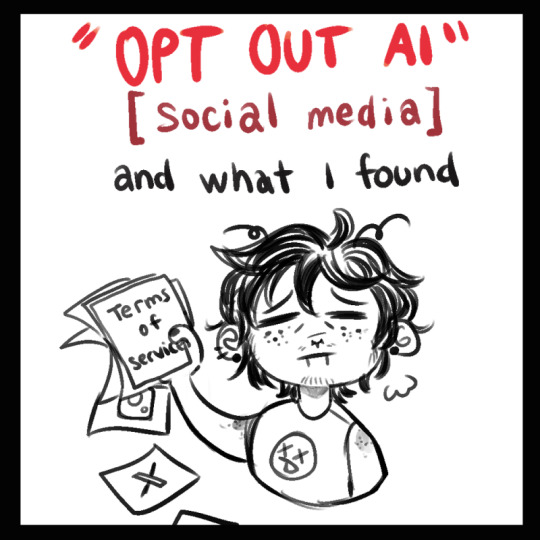
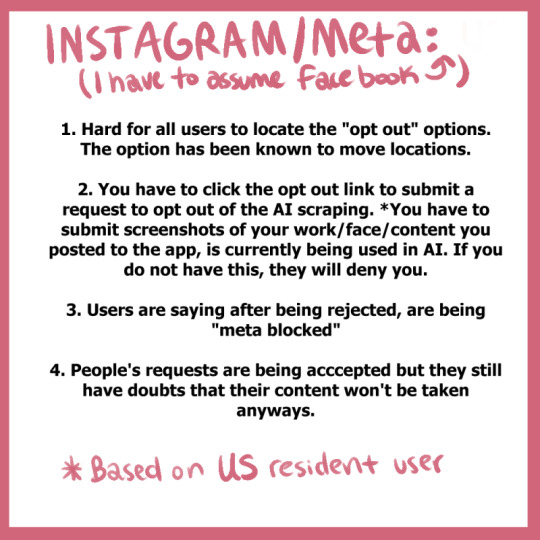
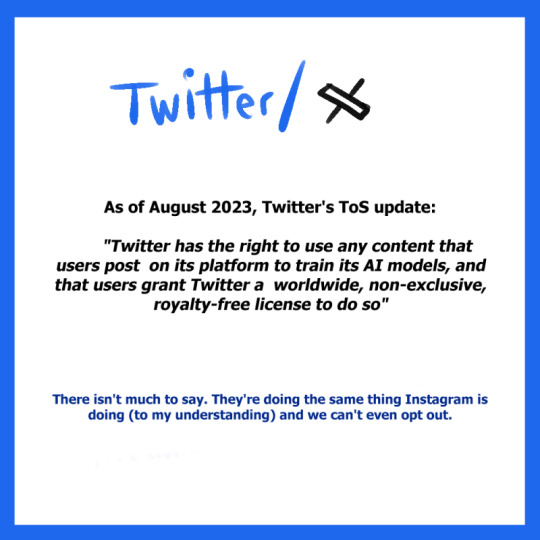
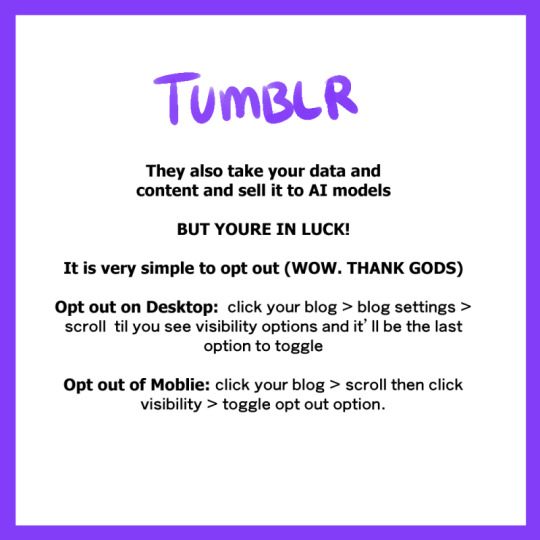
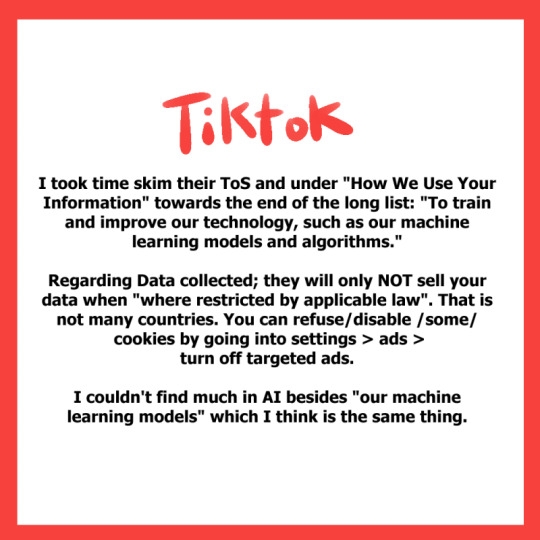
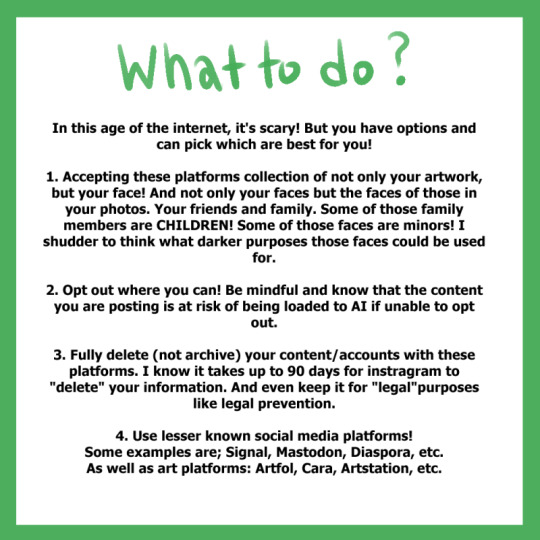

I spent the evening looking into this AI shit and made a wee informative post of the information I found and thought all artists would be interested and maybe help yall?
edit: forgot to mention Glaze and Nightshade to alter/disrupt AI from taking your work into their machines. You can use these and post and it will apparently mess up the AI and it wont take your content into it's machine!
edit: ArtStation is not AI free! So make sure to read that when signing up if you do! (this post is also on twt)
[Image descriptions: A series of infographics titled: “Opt Out AI: [Social Media] and what I found.” The title image shows a drawing of a person holding up a stack of papers where the first says, ‘Terms of Service’ and the rest have logos for various social media sites and are falling onto the floor. Long transcriptions follow.
Instagram/Meta (I have to assume Facebook).
Hard for all users to locate the “opt out” options. The option has been known to move locations.
You have to click the opt out link to submit a request to opt out of the AI scraping. *You have to submit screenshots of your work/face/content you posted to the app, is curretnly being used in AI. If you do not have this, they will deny you.
Users are saying after being rejected, are being “meta blocked”
People’s requests are being accepted but they still have doubts that their content won’t be taken anyways.
Twitter/X
As of August 2023, Twitter’s ToS update:
“Twitter has the right to use any content that users post on its platform to train its AI models, and that users grant Twitter a worldwide, non-exclusive, royalty-free license to do so.”
There isn’t much to say. They’re doing the same thing Instagram is doing (to my understanding) and we can’t even opt out.
Tumblr
They also take your data and content and sell it to AI models.
But you’re in luck!
It is very simply to opt out (Wow. Thank Gods)
Opt out on Desktop: click on your blog > blog settings > scroll til you see visibility options and it’ll be the last option to toggle
Out out of Mobile: click your blog > scroll then click visibility > toggle opt out option
TikTok
I took time skim their ToS and under “How We Use Your Information” and towards the end of the long list: “To train and improve our technology, such as our machine learning models and algorithms.”
Regarding data collected; they will only not sell your data when “where restricted by applicable law”. That is not many countries. You can refuse/disable some cookies by going into settings > ads > turn off targeted ads.
I couldn’t find much in AI besides “our machine learning models” which I think is the same thing.
What to do?
In this age of the internet, it’s scary! But you have options and can pick which are best for you!
Accepting these platforms collection of not only your artwork, but your face! And not only your faces but the faces of those in your photos. Your friends and family. Some of those family members are children! Some of those faces are minors! I shudder to think what darker purposes those faces could be used for.
Opt out where you can! Be mindful and know the content you are posting is at risk of being loaded to AI if unable to opt out.
Fully delete (not archive) your content/accounts with these platforms. I know it takes up to 90 days for instagram to “delete” your information. And even keep it for “legal” purposes like legal prevention.
Use lesser known social media platforms! Some examples are; Signal, Mastodon, Diaspora, et. As well as art platforms: Artfol, Cara, ArtStation, etc.
The last drawing shows the same person as the title saying, ‘I am, by no means, a ToS autistic! So feel free to share any relatable information to these topics via reply or qrt!
I just wanted to share the information I found while searching for my own answers cause I’m sure people have the same questions as me.’ \End description] (thank you @a-captions-blog!)
4K notes
·
View notes
Text
There Were Always Enshittifiers
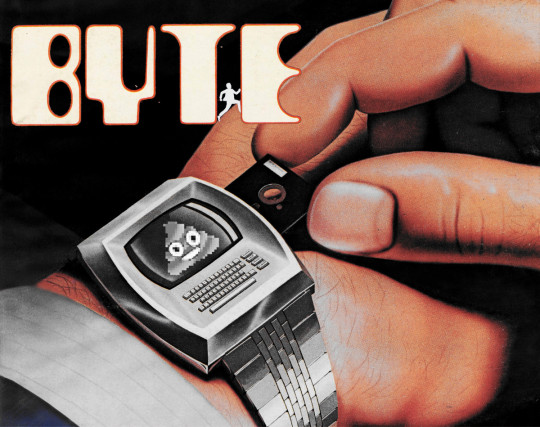
I'm on a 20+ city book tour for my new novel PICKS AND SHOVELS. Catch me in DC TONIGHT (Mar 4), and in RICHMOND TOMORROW (Mar 5). More tour dates here. Mail-order signed copies from LA's Diesel Books.

My latest Locus column is "There Were Always Enshittifiers." It's a history of personal computing and networked communications that traces the earliest days of the battle for computers as tools of liberation and computers as tools for surveillance, control and extraction:
https://locusmag.com/2025/03/commentary-cory-doctorow-there-were-always-enshittifiers/
The occasion for this piece is the publication of my latest Martin Hench novel, a standalone book set in the early 1980s called "Picks and Shovels":
https://us.macmillan.com/books/9781250865908/picksandshovels
The MacGuffin of Picks and Shovels is a "weird PC" company called Fidelity Computing, owned by a Mormon bishop, a Catholic priest, and an orthodox rabbi. It sounds like the setup for a joke, but the punchline is deadly serious: Fidelity Computing is a pyramid selling cult that preys on the trust and fellowship of faith groups to sell the dreadful Fidelity 3000 PC and its ghastly peripherals.
You see, Fidelity's products are booby-trapped. It's not merely that they ship with programs whose data-files can't be read by apps on any other system – that's just table stakes. Fidelity's got a whole bag of tricks up its sleeve – for example, it deliberately damages a specific sector on every floppy disk it ships. The drivers for its floppy drive initialize any read or write operation by checking to see if that sector can be read. If it can, the computer refuses to recognize the disk. This lets the Reverend Sirs (as Fidelity's owners style themselves) run a racket where they sell these deliberately damaged floppies at a 500% markup, because regular floppies won't work on the systems they lure their parishioners into buying.
Or take the Fidelity printer: it's just a rebadged Okidata ML-80, the workhorse tractor feed printer that led the market for years. But before Fidelity ships this printer to its customers, they fit it with new tractor feed sprockets whose pins are slightly more widely spaced than the standard 0.5" holes on the paper you can buy in any stationery store. That way, Fidelity can force its customers to buy the custom paper that they exclusively peddle – again, at a massive markup.
Needless to say, printing with these wider sprocket holes causes frequent jams and puts a serious strain on the printer's motors, causing them to burn out at a high rate. That's great news – for Fidelity Computing. It means they get to sell you more overpriced paper so you can reprint the jobs ruined by jams, and they can also sell you their high-priced, exclusive repair services when your printer's motors quit.
Perhaps you're thinking, "OK, but I can just buy a normal Okidata printer and use regular, cheap paper, right?" Sorry, the Reverend Sirs are way ahead of you: they've reversed the pinouts on their printers' serial ports, and a normal printer won't be able to talk to your Fidelity 3000.
If all of this sounds familiar, it's because these are the paleolithic ancestors of today's high-tech lock-in scams, from HP's $10,000/gallon ink to Apple and Google's mobile app stores, which cream a 30% commission off of every dollar collected by an app maker. What's more, these ancient, weird misfeatures have their origins in the true history of computing, which was obsessed with making the elusive, copy-proof floppy disk.
This Quixotic enterprise got started in earnest with Bill Gates' notorious 1976 "open letter to hobbyists" in which the young Gates furiously scolds the community of early computer hackers for its scientific ethic of publishing, sharing and improving the code that they all wrote:
https://en.wikipedia.org/wiki/An_Open_Letter_to_Hobbyists
Gates had recently cloned the BASIC programming language for the popular Altair computer. For Gates, his act of copying was part of the legitimate progress of technology, while the copying of his colleagues, who duplicated Gates' Altair BASIC, was a shameless act of piracy, destined to destroy the nascent computing industry:
As the majority of hobbyists must be aware, most of you steal your software. Hardware must be paid for, but software is something to share. Who cares if the people who worked on it get paid?
Needless to say, Gates didn't offer a royalty to John Kemeny and Thomas Kurtz, the programmers who'd invented BASIC at Dartmouth College in 1963. For Gates – and his intellectual progeny – the formula was simple: "When I copy you, that's progress. When you copy me, that's piracy." Every pirate wants to be an admiral.
For would-be ex-pirate admirals, Gates's ideology was seductive. There was just one fly in the ointment: computers operate by copying. The only way a computer can run a program is to copy it into memory – just as the only way your phone can stream a video is to download it to its RAM ("streaming" is a consensus hallucination – every stream is a download, and it has to be, because the internet is a data-transmission network, not a cunning system of tubes and mirrors that can make a picture appear on your screen without transmitting the file that contains that image).
Gripped by this enshittificatory impulse, the computer industry threw itself headfirst into the project of creating copy-proof data, a project about as practical as making water that's not wet. That weird gimmick where Fidelity floppy disks were deliberately damaged at the factory so the OS could distinguish between its expensive disks and the generic ones you bought at the office supply place? It's a lightly fictionalized version of the copy-protection system deployed by Visicalc, a move that was later publicly repudiated by Visicalc co-founder Dan Bricklin, who lamented that it confounded his efforts to preserve his software on modern systems and recover the millions of data-files that Visicalc users created:
http://www.bricklin.com/robfuture.htm
The copy-protection industry ran on equal parts secrecy and overblown sales claims about its products' efficacy. As a result, much of the story of this doomed effort is lost to history. But back in 2017, a redditor called Vadermeer unearthed a key trove of documents from this era, in a Goodwill Outlet store in Seattle:
https://www.reddit.com/r/VintageApple/comments/5vjsow/found_internal_apple_memos_about_copy_protection/
Vaderrmeer find was a Apple Computer binder from 1979, documenting the company's doomed "Software Security from Apple's Friends and Enemies" (SSAFE) project, an effort to make a copy-proof floppy:
https://archive.org/details/AppleSSAFEProject
The SSAFE files are an incredible read. They consist of Apple's best engineers beavering away for days, cooking up a new copy-proof floppy, which they would then hand over to Apple co-founder and legendary hardware wizard Steve Wozniak. Wozniak would then promptly destroy the copy-protection system, usually in a matter of minutes or hours. Wozniak, of course, got the seed capital for Apple by defeating AT&T's security measures, building a "blue box" that let its user make toll-free calls and peddling it around the dorms at Berkeley:
https://512pixels.net/2018/03/woz-blue-box/
Woz has stated that without blue boxes, there would never have been an Apple. Today, Apple leads the charge to restrict how you use your devices, confining you to using its official app store so it can skim a 30% vig off every dollar you spend, and corralling you into using its expensive repair depots, who love to declare your device dead and force you to buy a new one. Every pirate wants to be an admiral!
https://www.vice.com/en/article/tim-cook-to-investors-people-bought-fewer-new-iphones-because-they-repaired-their-old-ones/
Revisiting the early PC years for Picks and Shovels isn't just an excuse to bust out some PC nostalgiacore set-dressing. Picks and Shovels isn't just a face-paced crime thriller: it's a reflection on the enshittificatory impulses that were present at the birth of the modern tech industry.
But there is a nostalgic streak in Picks and Shovels, of course, represented by the other weird PC company in the tale. Computing Freedom is a scrappy PC startup founded by three women who came up as sales managers for Fidelity, before their pangs of conscience caused them to repent of their sins in luring their co-religionists into the Reverend Sirs' trap.
These women – an orthodox lesbian whose family disowned her, a nun who left her order after discovering the liberation theology movement, and a Mormon woman who has quit the church over its opposition to the Equal Rights Amendment – have set about the wozniackian project of reverse-engineering every piece of Fidelity hardware and software, to make compatible products that set Fidelity's caged victims free.
They're making floppies that work with Fidelity drives, and drives that work with Fidelity's floppies. Printers that work with Fidelity computers, and adapters so Fidelity printers will work with other PCs (as well as resprocketing kits to retrofit those printers for standard paper). They're making file converters that allow Fidelity owners to read their data in Visicalc or Lotus 1-2-3, and vice-versa.
In other words, they're engaged in "adversarial interoperability" – hacking their own fire-exits into the burning building that Fidelity has locked its customers inside of:
https://www.eff.org/deeplinks/2019/10/adversarial-interoperability
This was normal, back then! There were so many cool, interoperable products and services around then, from the Bell and Howell "Black Apple" clones:
https://forum.vcfed.org/index.php?threads%2Fbell-howell-apple-ii.64651%2F
to the amazing copy-protection cracking disks that traveled from hand to hand, so the people who shelled out for expensive software delivered on fragile floppies could make backups against the inevitable day that the disks stopped working:
https://en.wikipedia.org/wiki/Bit_nibbler
Those were wild times, when engineers pitted their wits against one another in the spirit of Steve Wozniack and SSAFE. That era came to a close – but not because someone finally figured out how to make data that you couldn't copy. Rather, it ended because an unholy coalition of entertainment and tech industry lobbyists convinced Congress to pass the Digital Millennium Copyright Act in 1998, which made it a felony to "bypass an access control":
https://www.eff.org/deeplinks/2016/07/section-1201-dmca-cannot-pass-constitutional-scrutiny
That's right: at the first hint of competition, the self-described libertarians who insisted that computers would make governments obsolete went running to the government, demanding a state-backed monopoly that would put their rivals in prison for daring to interfere with their business model. Plus ça change: today, their intellectual descendants are demanding that the US government bail out their "anti-state," "independent" cryptocurrency:
https://www.citationneeded.news/issue-78/
In truth, the politics of tech has always contained a faction of "anti-government" millionaires and billionaires who – more than anything – wanted to wield the power of the state, not abolish it. This was true in the mainframe days, when companies like IBM made billions on cushy defense contracts, and it's true today, when the self-described "Technoking" of Tesla has inserted himself into government in order to steer tens of billions' worth of no-bid contracts to his Beltway Bandit companies:
https://www.reuters.com/world/us/lawmakers-question-musk-influence-over-verizon-faa-contract-2025-02-28/
The American state has always had a cozy relationship with its tech sector, seeing it as a way to project American soft power into every corner of the globe. But Big Tech isn't the only – or the most important – US tech export. Far more important is the invisible web of IP laws that ban reverse-engineering, modding, independent repair, and other activities that defend American tech exports from competitors in its trading partners.
Countries that trade with the US were arm-twisted into enacting laws like the DMCA as a condition of free trade with the USA. These laws were wildly unpopular, and had to be crammed through other countries' legislatures:
https://pluralistic.net/2024/11/15/radical-extremists/#sex-pest
That's why Europeans who are appalled by Musk's Nazi salute have to confine their protests to being loudly angry at him, selling off their Teslas, and shining lights on Tesla factories:
https://www.malaymail.com/news/money/2025/01/24/heil-tesla-activists-protest-with-light-projection-on-germany-plant-after-musks-nazi-salute-video/164398
Musk is so attention-hungry that all this is as apt to please him as anger him. You know what would really hurt Musk? Jailbreaking every Tesla in Europe so that all its subscription features – which represent the highest-margin line-item on Tesla's balance-sheet – could be unlocked by any local mechanic for €25. That would really kick Musk in the dongle.
The only problem is that in 2001, the US Trade Rep got the EU to pass the EU Copyright Directive, whose Article 6 bans that kind of reverse-engineering. The European Parliament passed that law because doing so guaranteed tariff-free access for EU goods exported to US markets.
Enter Trump, promising a 25% tariff on European exports.
The EU could retaliate here by imposing tit-for-tat tariffs on US exports to the EU, which would make everything Europeans buy from America 25% more expensive. This is a very weird way to punish the USA.
On the other hand, not that Trump has announced that the terms of US free trade deals are optional (for the US, at least), there's no reason not to delete Article 6 of the EUCD, and all the other laws that prevent European companies from jailbreaking iPhones and making their own App Stores (minus Apple's 30% commission), as well as ad-blockers for Facebook and Instagram's apps (which would zero out EU revenue for Meta), and, of course, jailbreaking tools for Xboxes, Teslas, and every make and model of every American car, so European companies could offer service, parts, apps, and add-ons for them.
When Jeff Bezos launched Amazon, his war-cry was "your margin is my opportunity." US tech companies have built up insane margins based on the IP provisions required in the free trade treaties it signed with the rest of the world.
It's time to delete those IP provisions and throw open domestic competition that attacks the margins that created the fortunes of oligarchs who sat behind Trump on the inauguration dais. It's time to bring back the indomitable hacker spirit that the Bill Gateses of the world have been trying to extinguish since the days of the "open letter to hobbyists." The tech sector built a 10 foot high wall around its business, then the US government convinced the rest of the world to ban four-metre ladders. Lift the ban, unleash the ladders, free the world!
In the same way that futuristic sf is really about the present, Picks and Shovels, an sf novel set in the 1980s, is really about this moment.
I'm on tour with the book now – if you're reading this today (Mar 4) and you're in DC, come see me tonight with Matt Stoller at 6:30PM at the Cleveland Park Library:
https://www.loyaltybookstores.com/picksnshovels
And if you're in Richmond, VA, come down to Fountain Bookshop and catch me with Lee Vinsel tomorrow (Mar 5) at 7:30PM:
https://fountainbookstore.com/events/1795820250305

If you'd like an essay-formatted version of this post to read or share, here's a link to it on pluralistic.net, my surveillance-free, ad-free, tracker-free blog:
https://pluralistic.net/2025/03/04/object-permanence/#picks-and-shovels
#pluralistic#picks and shovels#history#web theory#marty hench#martin hench#red team blues#locus magazine#drm#letter to computer hobbyists#bill gates#computer lib#science fiction#crime fiction#detective fiction
498 notes
·
View notes
Text
youtube
Welcome to FathomVerse 🦑🐟🦀
A new mobile game launching today allows anyone with a smartphone or tablet to take part in ocean exploration and discovery. Now available for download on the App Store and Google Play, FathomVerse allows players to interact with real underwater images to improve the artificial intelligence that helps researchers study ocean life.
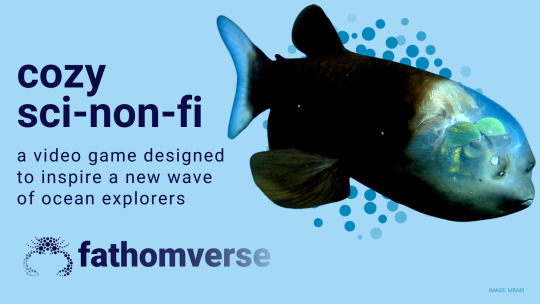
Scientists are collecting massive amounts of images and video to study marine life and assess ocean health. AI can help researchers analyze this deluge of visual data more efficiently. Before AI can be used for ocean exploration, machine learning models need to be trained to identify ocean animals.

FathomVerse seeks to address this challenge by engaging ocean enthusiasts around the world to help review and label images so AI can correctly recognize ocean animals. The game combines immersive imagery, compelling gameplay, and cutting-edge science to inspire a new wave of ocean explorers. Learn more on our website.
310 notes
·
View notes
Text
PLUTO IN AQUARIUS: UTOPIA OR DYSTOPIA
Many posts I see about Pluto are either dystopian or utopian.
Some are quick to point out that Pluto (power) in Aquarius (sign of the people) signifies mass control and devastations faced by large numbers of people, which I don’t deny at all.
But there’s the other side of the coin as well in which the collective is tired of being pushed around with some even hitting rock bottom, and are now ready to dismantle the old paradigm to move on to something else or even build something new in response.
Pluto in Aquarius at best is the story of the underdogs discovering and utilizing their power after being relentlessly tormented.
With Pluto involved, we first encounter grim conditions that we can no longer tolerate. And then we become ready to knock it down in order to create or emerge in another sphere that is more ideal.
You cannot have one without the other in a world of polarity. And Pluto highlights this polarity.
Once you come to terms with this, you can work with Pluto and even fall in love with him.
You can go into a dark basement even if it’s scary, and face your fears and look them in the eye and even make room for your fears to exist while taking action.
It’s like when Dorothy and her friends discover who the Wizard of Oz truly is.
Behind the curtains, he is an ordinary individual using tricks and illusions to appear more intimidating than he really is.
This brings me to what’s happening now…
None of the tech giants and heads of state who seem to have colossal influence are as powerful as they appear.
They may issue draconian measures to control and wreak havoc on the masses and gaslight them in the process.
But such measures also backfire.
Just like with the recent TikTok ban in the U.S. (which has now been reversed), which drove millions of people to RedNote (a Chinese social media platform similar to TikTok) where Western users are now discovering (sometimes in awe) a new world they didn’t know existed.
It’s interesting that on the same week when RedNote became the most downloaded app (just days before the ban), Meta shares took a plunge.
It was then when Zuckerberg issued a statement that he will get rid of fact-checkers and introduce community notes instead.
The panic on his face when he made this statement was hard to ignore.
Also, many members of congress who voted for the ban invested in Meta stocks, prior to the ban.
One of the justifications for the ban was that the magnitude of data the app collected posed a national security threat.
After digging deeper, I’m finding out that apparently Meta collects more data than TikTok.
These are not topics that are reported in mainstream media.
With Uranus (freedom, cutting-edge technology) ingressing into Gemini (sign of communications) this year on 7 Jul 2025 (GMT), I expect a plethora of social media apps to emerge.
Uranus, the modern ruler of Aquarius, upholds freedom to be of utmost importance.
My prediction is that many of the upcoming social media platforms will respect people’s privacy a lot more and will not censor people’s voices as much, especially as we move closer to the Uranus-Pluto trine (lucky aspect) which will be exact next year.
Another topic not being covered in mainstream media is that Kansas (along with a number of other states in the U.S.) filed a civil suit against one of the most well-known pharmaceutical companies (you all know the name) for misleading the public and using deceptive marketing during the pandemic.
The point I’m trying to make is that actions are being taken to hold powerful companies and forces (that seemed invincible) accountable – this is the other side of the coin of Pluto (power) in empowering the collective (Aquarius).
Just because we don’t see these headlines in mainstream news outlets doesn’t mean that such countermeasures don’t exist.
The more we become aware of people standing up for the underdog and mobilizing themselves (including the underdogs themselves) to take action, the more we can empower ourselves with Pluto in Aquarius.
#astrology#psychic#witchcraft#tarot#free palestine#birth chart#art#tarot reading#tarot cards#tarotcommunity#pluto in aquarius#aquarius#astrology observations#astrologyblr#astro community#astrologer#astrology community#astroblr#astro observations
49 notes
·
View notes
Note
After seeing your weatherbugapp reblog i installed duckduckgo and tried it.

I don't know much about technology tbh but i downloaded this app less than 30 mins ago and in that time google tried to track me 112 times?? And they tried to collect finger prints? And my first and last name? And my gender? And my country, state and city? My gps coordinates? My postal code? My network carrier? My fricking battery level for whatever reason? Can you please tell me if this is normal at all, because i'm freaking out right now. I just turned 18 and started using mobile banking and stuff and this shit scares me
Why tf does it need to know my screen density???my system volume????my charging status????? What tf are they cooking
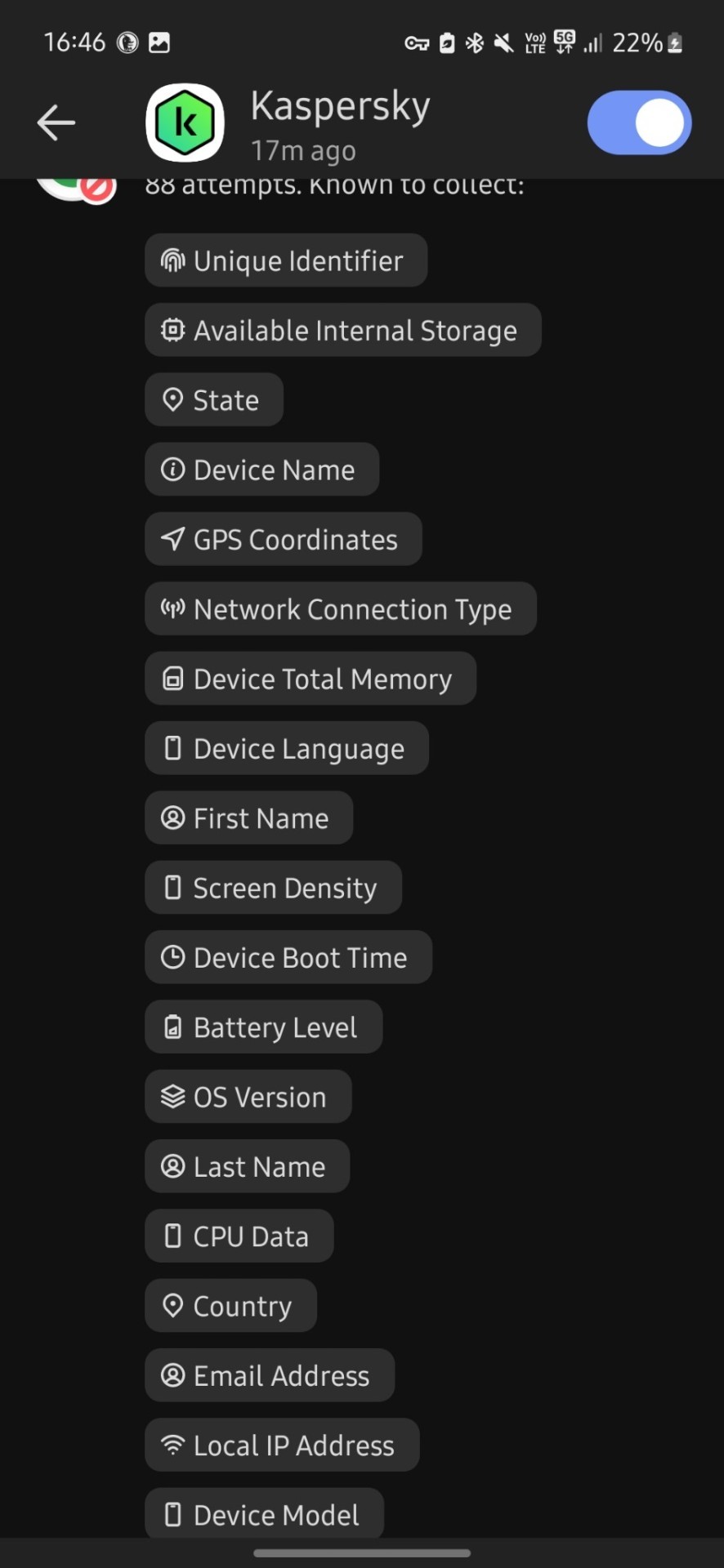
Now it's at 476 tracking attempts bro???? barely 5 mins passed.....
I condensed your three asks into one for readability!
And yeah, I'm very far from an expert about any of this, but as far as I know that's just. Normal. That's the normal amount of spying they're doing on your phone. I assume the numbers we see are to some extent because having been foiled, a lot of these scripts try repeatedly, since I can't imagine what use thousands of trackers per phone would be even to the great aggregators.
Tracking the phone stuff like screen resolution and battery level is because (apart from that definitely not being considered remotely 'private' so it's Free Real Estate) in aggregate that data can be used to track what phone use patterns are like on a demographic scale and therefore. Where the smart money is.
Almost all of this is getting sold in bulk for ad targeting and market analysis. This does presumably make it very hard to notice when like. Actually important stuff is being spied on, which is why I feel better about Having Apps with the duckduckgo app blocker thing.
My bank's app reportedly sells data to a couple aggregators including Google. Not like, my banking info, but it's still so offensive on principle that I avoid using the app unless I have to, and force stop it afterward.
The patterns that show up on the weekly duckduckgo blocker report are interesting. Hoopla attempts about two orders of magnitude more tracking than Libby, which makes sense because they're a commercial streaming service libraries pay by the unit for access, while Libby is a content management software run by a corporation that values its certification as a 'B' company--that is, one invested in the public good that can be trusted. The cleanness of their brand is a great deal of its value, so they have to care about their image and be a little more scrupulous.
Which doesn't mean not being a little bit spyware, because everything is spyware now. Something else I've noticed is that in terms of free game apps, the polished professional stuff is now much more invasive than the random kinda janky thing someone just threw together.
Back in the day you tended to expect the opposite, because spyware was a marginal shifty profit-margin with too narrow a revenue stream to be worth more to an established brand than their reputation, but now that everyone does it there's not a lot of reputation cost and refraining would be sacrificing a potential revenue stream, which is Irresponsible Conduct for a corporation.
While meanwhile 'developing a free game app to put on the game store' is something a person can do for free with the hardware they already have for home use, as a hobby or practice or to put on their coding resume. So while such apps absolutely can be malicious and more dangerous when they are than The Big Brand, they can also be neutral in a way commercial stuff no longer is. Wild world.
But yeah for the most part as far as I can make out, these are just The Commercial Panopticon, operating as intended. It's gross but it probably doesn't indicate anything dangerous on an individual level.
56 notes
·
View notes
Text
Former astronaut Sen. Mark Kelly started spy balloon company funded by China
Kelly, 60, is a former astronaut and US Navy captain who has represented Arizona in the US Senate since 2020
Before becoming a senator, Mark Kelly, D-Ariz., was not only an astronaut, but he also co-founded a company that specializes in spy balloons, which was funded, in part, by a venture capitalist in China with close ties to the Chinese Communist Party.
Kelly, who is reportedly on a short list of running mate contenders under consideration by Vice President Kamala Harris, co-founded Tucson, Arizona-based World View in 2012 with a vision to provide space tourism using stratospheric balloons.
While Kelly’s company started out with a focus on space tourism via balloons, the vision evolved with the maturing of the company’s technology.
"As we matured our technology, we recognized an opportunity for immediate use cases for our technology through remote sensing services to defense, scientific and commercial customers," a spokesperson for World View told Fox News Digital. "Today, our primary business remains providing remote sensing services to the U.S. Department of Defense and her allies by way of intelligence, surveillance and reconnaissance capabilities, as well as servicing scientific organizations like NASA, NOAA and others to better understand Earth from the unique atmospheric layer of the stratosphere."

Axios reported that shortly after World View was started, it received venture capital from Tencent in 2013, then again in 2016.
Tencent is one of China's largest corporations, and it was founded in 1998 by "Pony" Ma Huateng, Zhang Zhidong, Xu Chenye, Chen Yidan and Zeng Liqing. Last year, "Pony" Ma Huateng was listed by Forbes as the fourth-richest man in China with a net worth of $32.1 billion. Ma is also the CEO of Tencent.
The Wall Street Journal reported in 2021 that Tencent collected a trove of data over the years from its mobile app WeChat, the predominant social-media platform in China. The data was collected through its processing of the chat conversations and financial transactions of its over one billion monthly active users, most of them in China. That has made the company’s platform WeChat a powerful surveillance tool for the Chinese government, which reportedly regulates Tencent and regularly has it suppress dissenting views.

23 notes
·
View notes
Text

#Project Completion Report#Final Inspection Checklist#Project Handover Checklist#Punch List App#Snag List App#land survey app#Mobile Data Collection App#offline survey app#mobile form app
0 notes
Text
Learn best practices for automated data scraping to avoid blocks and extract valuable insights efficiently. Optimize your web scraping strategies today!
#automated data scraping#Automate web scraping#legal data collection#Automate data collection#mobile app scraping#instant data scraper#web scraping
0 notes
Text
On ThursdaY, Reuters published a photo depicting then-United States national security adviser Mike Waltz checking his phone during a cabinet meeting held by President Trump in the White House. If you enlarge the portion of the image that captures Waltz’s screen, it seems to show him using the end-to-end encrypted messaging app Signal. But if you look more closely, a notification on the screen refers to the app as “TM SGNL.” During a White House cabinet meeting on Wednesday, then, Waltz was apparently using an Israeli-made app called TeleMessage Signal to message with people who appear to be top US officials, including JD Vance, Marco Rubio, and Tulsi Gabbard.
After senior Trump administration cabinet members used vanishing Signal messages to coordinate March military strikes in Yemen—and accidentally included the editor in chief of The Atlantic in the group chat—the “SignalGate” scandal highlighted concerning breaches of traditional government “operational security” protocol as well as compliance issues with federal records-retention laws. At the center of the debacle was Waltz, who was ousted by Trump as US national security adviser on Thursday. Waltz created the “Houthi PC Small Group” chat and was the member who added top Atlantic editor Jeffrey Goldberg. "I take full responsibility. I built the group," Waltz told Fox News in late March. "We've got the best technical minds looking at how this happened," he added at the time.
SignalGate had nothing to do with Signal. The app was functioning normally and was simply being used at an inappropriate time for an incredibly sensitive discussion that should have been carried out on special-purpose, hardened federal devices and software platforms. If you're going to flout the protocols, though, Signal is (relatively speaking) a good place to do it, because the app is designed so only the senders and receivers of messages in a group chat can read them. And the app is built to collect as little information as possible about its users and their associates. This means that if US government officials were chatting on the app, spies or malicious hackers could only access their communications by directly compromising participants' devices—a challenge that is potentially surmountable but at least limits possible access points. Using an app like TeleMessage Signal, though, presumably in an attempt to comply with data retention requirements, opens up numerous other paths for adversaries to access messages.
"I don't even know where to start with this," says Jake Williams, a former NSA hacker and vice president of research and development at Hunter Strategy. “It's mind-blowing that the federal government is using Israeli tech to route extremely sensitive data for archival purposes. You just know that someone is grabbing a copy of that data. Even if TeleMessage isn't willingly giving it up, they have just become one of the biggest nation-state targets out there.”
TeleMessage was founded in Israel in 1999 by former Israel Defense Forces technologists and run out of the country until it was acquired last year by the US-based digital communications archiving company Smarsh. The service creates duplicates of communication apps that are outfitted with a “mobile archiver” tool to record and store messages sent through the app.
“Capture, archive and monitor mobile communication: SMS, MMS, Voice Calls, WhatsApp, WeChat, Telegram & Signal,” TeleMessage says on its website. For Signal it adds, “Record and capture Signal calls, texts, multimedia and files on corporate-issued and employee BYOD phones.” (BYOD stands for bring your own device.) In other words, there are TeleMessage versions of Signal for essentially any mainstream consumer device. The company says that using TeleMessage Signal, users can “Maintain all Signal app features and functionality as well as the Signal encryption,” adding that the app provides “End-to-End encryption from the mobile phone through to the corporate archive.” The existence of “the corporate archive,” though, undermines the privacy and security of the end-to-end encryption scheme.
TeleMessage apps are not approved for use under the US government's Federal Risk and Authorization Management Program or FedRAMP. TeleMessage and Smarsh did not immediately return requests for comment about whether their products are used by the US federal government and in what capacity.
"As we have said many times, Signal is an approved app for government use and is loaded on government phones,” White House press secretary Anna Kelly tells WIRED. She did not answer questions about whether the White House approves of federal officials using TeleMessage Signal—which is a different app from Signal—or whether other officials aside from Waltz have used the app or currently use it.
The Cybersecurity and Infrastructure Security Agency does not create policy around federal technology use but does release public guidance. When asked about Waltz’s apparent use of TeleMessage Signal, CISA simply referred WIRED to its best-practices guide for mobile communications. The document specifically advises, “When selecting an end-to-end encrypted messaging app, evaluate the extent to which the app and associated services collect and store metadata.”
It is not clear when Waltz started using TeleMessage Signal and whether he was already using it during SignalGate or started using it afterward in response to criticisms that turning on Signal's disappearing messages feature is in conflict with federal data-retention laws.
“I have no doubt the leadership of the US national security apparatus ran this software through a full information-assurance process to ensure there was no information leakage to foreign nations,” says Johns Hopkins cryptographer Matt Green. “Because if they didn’t, we are screwed.”
14 notes
·
View notes
Text
Grocery Delivery App Scraping Services | Extract Grocery Price Data
Gain a competitive edge with our Grocery Delivery App Scraping Services. Extract grocery price data from top USA, UAE, Canada, China, India, and Spain retailers.
know more: https://www.mobileappscraping.com/grocery-delivery-app-scraping-services.php
#Grocery Delivery App Scraping Services#Extract Grocery Price Data#scraped from grocery delivery mobile apps#Mobile App Data Collection
0 notes
Text
Opting Out of AI Data Collection from All Meta Apps
Idk how many of you with any Meta apps (Facebook, Instagram, WhatsApp, etc.) are aware, but Meta is using your posts to collect data. The good news is that you can opt out of their data collection. It's relatively simple.
I have heard, however, that a lot of Americans aren't seeing this feature yet. It seems that it might still be rolling out, but do make sure to keep your app updated.
Go to your profile. (I will be using Instragram in this case, but the objection will apply to your Meta account in general.)
In the top right corner, you will see the three horizontal lines (on mobile). Press that.
Select "Settings and Privacy."
Scroll all the way down to "About." Press that.
Select "Privacy Policy."
That first box at the top will have some blue hyperlinks in the text. Select "right to object." It will be in the second sentence.
Type in your reasons in the boxes. This is what I wrote:
First box: "I own all the copyright on my photography/art and I object to my work being used to train AI." Second box: "AI has been harmful towards artists and creators, stealing their work without permission to then let anyone use, manipulate, claim as their own, and in some cases, make a profit from. This is theft."
I got an email back from them within 30 minutes saying my objection has been reviewed and accepted:

81 notes
·
View notes
Text
fr you should regularly go into account settings on every site you use and make sure everything enabled is what you expected. do this BOTH via mobile apps and via browser. it isn't uncommon for browser views to offer more options than apps. this isn't even due to maybe running an outdated version of an app. apps are released for easy consent to collect personal data and to serve ads, not because their platforms want to make anything easier to access.
122 notes
·
View notes